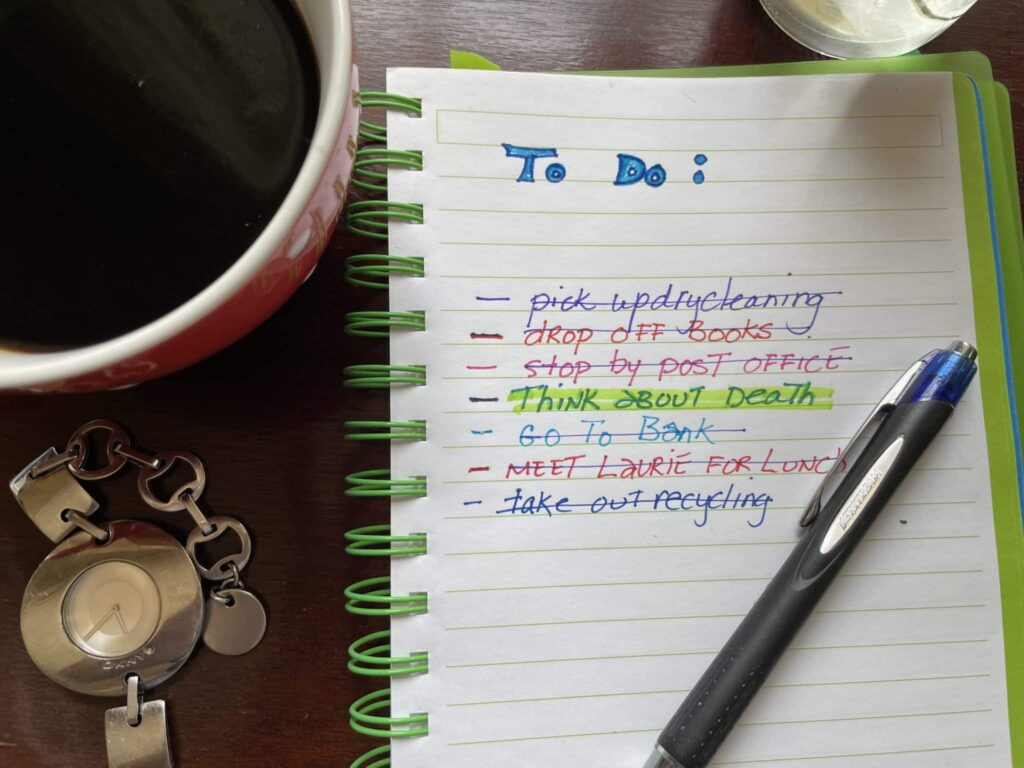If you had told me a few years ago that thinking and talking about death would make my life better, well, I might have just died from shock.
I certainly hadn’t heard the term, “death positive,” and couldn’t imagine how death was a positive thing. The two words just didn’t go together. But then I took on a contract with the When You Die Project and to my surprise, I found that working with a death positive group has changed my life in positive and profound ways.
Like most people, I didn’t want to dwell on death. I had lost enough people and grieved enough loss to want to avoid the sadness altogether. And like most people, I recognized that we will all die someday, but I just pushed it aside because… well, I wasn’t going to die today. But the fact is, today is not over yet.
When I was a kid and would get upset by something that happened, my grandmother would ask me “What’s it going to matter in five years?” This was her way of getting me to “pick my battles” and not waste time on the unimportant. This lesson has come back to me, intertwined with my new perspective. These are things I try to remember when I’m angry (mostly at inanimate objects!) or frustrated (by animate objects – people!) In the grand scheme of it all, what’s it going to matter, never mind in five years, what about in five days? Because we are not promised a tomorrow. So how much of our precious life do we want to spend on non-precious issues? It’s not always easy; sure, I still swear at my internet connection or rage about social media posts or, worse, comments on news stories. (Constant note to self: do NOT read the comments!!)
Of course, we do not go blindly through this life. Every death, every loss makes us think about how we have to make moments count, live in the present. But then life happens, and we get caught up in the everyday, tangled in the minutia, and the unimportant details. It’s easy to do. But it’s not hard to get in the habit of thinking about your death on a regular basis. There are even apps to help with that.
Apps like Wecroak tell us we can find happiness by contemplating our mortality. This comes from the Bhutanese saying, “To be a happy person, one should contemplate death five times daily.” A few random times throughout the day they send you a message with a quote. These messages are meant to make you pause, to make you think about the implications of your death. It fills you with an urgency to make every moment mean something, to not “sweat the small stuff.” And then the funniest thing happens. You become grateful (and this is where the small stuff comes into play); you become grateful for every little thing, like sunny days, gentle rains, ocean breezes, and a really good peach.
Thinking about death leads to talking about death. Yes, I’m now THAT guest that brings up end of life conversations at social gatherings. Not in a morbid, depressing way, but in a way that (hopefully) helps to normalize the topic. I’m like the convert, preaching the good word. Because, in the end, we’re all going to die. The ones we love will leave us behind and, eventually, we will leave behind the ones we love. It should never come as a surprise, and it should never keep us from living.
 Everyone on the When You Die team has a “Memento Mori” coin. On one side is engraved, “Memento Mori” (remember you must die) and on the other is Memento Vivere (remember you must live). It is a reminder that death walks with us every day of our lives until the end; life and death are literally different sides of the same coin.
Everyone on the When You Die team has a “Memento Mori” coin. On one side is engraved, “Memento Mori” (remember you must die) and on the other is Memento Vivere (remember you must live). It is a reminder that death walks with us every day of our lives until the end; life and death are literally different sides of the same coin.
Reclaiming the conversation by looking at your death, you can reclaim your life. It’s never too late. Until it is.


